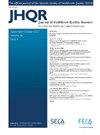Optimización del reprocesado de materiales sanitarios en centros de atención primaria
IF 1
Q4 HEALTH CARE SCIENCES & SERVICES
引用次数: 0
Abstract
Introduction and objetive
Reprocessing of medical devices in Primary Care Centers (PCC) can be a source of infections. The aim of this study was to improve the quality of reprocessing devices in the PCCs of Area VII-Murcia/Este through an improvement cycle.
Methods
This prospective intervention study. was carried out in 12 PCC, 14 Local Clinics (LC), 4 Oral Health Units (OHU) and the professionals involved in the reprocessing. Between 09/2022-03/2023, a working group was created, and a situation analysis was carried out: inventory of autoclaves, consumption of materials, and visits to the PCCs. Between 04/2023-03/2024, improvement actions were implemented: purchasing plan, use of Chemical Indicators (CHI) and Biological Indicators (BI), training with prior knowledge surveys, work procedure, and processes traceability.
Results
In total 11 autoclaves were acquired. The percentage of BI completion was ≥ 45%, and 80% of professionals were trained. The following improvements were obtained: detergent technical data sheet in the washing Area (45% to 73%), sterilization dates traceability (10% to 78%), sterilization cycles traceability (11% to 66%), use of instrument brush (55% to 74%), bag labeling (45% to 68%), correct storage (45% to 78%), and use of tap water to generate steam (2% to 0%).
Conclusions
The implementation of an improvement cycle, through the training of professionals, standardization of procedures, and traceability of processes, in addition to having an expert nurse as a reference, increases the quality in the reprocessing of medical devices.
在初级保健设施中优化卫生材料的后处理
初级保健中心(PCC)医疗器械的引入和处理可能是感染的一个来源。本研究的目的是通过一个改进周期来提高第七区穆尔西亚/埃斯特的PCCs的再处理设备的质量。方法前瞻性干预研究。在12个PCC、14个地方诊所、4个口腔保健单位和参与再处理的专业人员中进行。在2022年9月至2023年3月期间,成立了一个工作组,并进行了情况分析:热压灭菌器的库存,材料的消耗,以及对PCCs的访问。在204/04 - 2024 / 03期间,实施了改进措施:采购计划,化学指标(CHI)和生物指标(BI)的使用,预先知识调查培训,工作程序和过程可追溯性。结果共获得11台高压灭菌器。BI完成率≥45%,80%的专业人员接受过培训。取得了以下改进:洗涤区域的洗涤剂技术数据表(45%至73%),灭菌日期可追溯性(10%至78%),灭菌周期可追溯性(11%至66%),使用仪器刷(55%至74%),袋装标签(45%至68%),正确储存(45%至78%),使用自来水产生蒸汽(2%至0%)。结论通过专业人员的培训、流程的标准化和流程的可追溯性,以及有专家护士作为参考,实施改进周期,提高了医疗器械再加工的质量。
本文章由计算机程序翻译,如有差异,请以英文原文为准。
求助全文
约1分钟内获得全文
求助全文
来源期刊

Journal of Healthcare Quality Research
Medicine-Health Policy
CiteScore
1.70
自引率
8.30%
发文量
83
审稿时长
57 days
期刊介绍:
Revista de Calidad Asistencial (Quality Healthcare) (RCA) is the official Journal of the Spanish Society of Quality Healthcare (Sociedad Española de Calidad Asistencial) (SECA) and is a tool for the dissemination of knowledge and reflection for the quality management of health services in Primary Care, as well as in Hospitals. It publishes articles associated with any aspect of research in the field of public health and health administration, including health education, epidemiology, medical statistics, health information, health economics, quality management, and health policies. The Journal publishes 6 issues, exclusively in electronic format. The Journal publishes, in Spanish, Original works, Special and Review Articles, as well as other sections. Articles are subjected to a rigorous, double blind, review process (peer review)
 求助内容:
求助内容: 应助结果提醒方式:
应助结果提醒方式:


